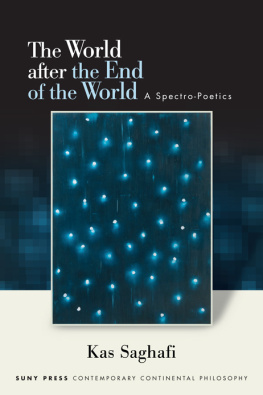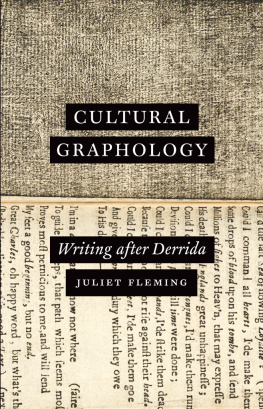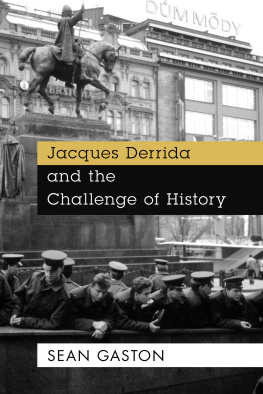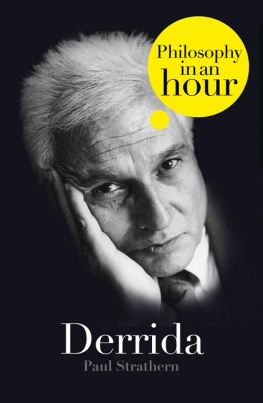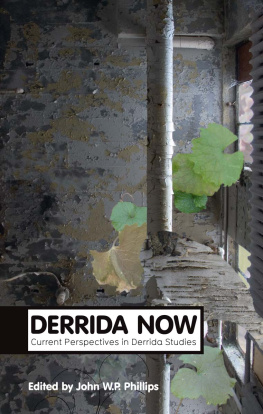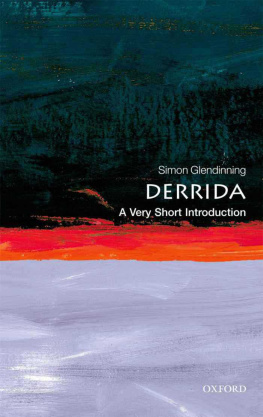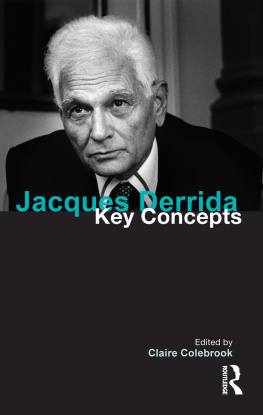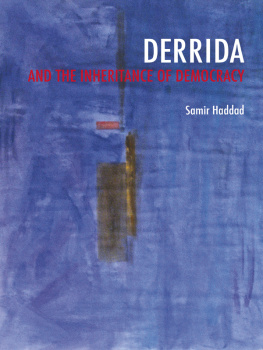The World after
the End of the World
SUNY series in Contemporary Continental Philosophy
Dennis J. Schmidt, editor
The World after
the End of the World
A Spectro-Poetics
Kas Saghafi
Ross Bleckner, Galaxy Painting , 60 by 45 in. (152 by 114 cm.), oil/canvas, 1993
Copyright: Ross Bleckner
Courtesy: Mary Boone Gallery, New York
Collection: Linda Pace Foundation, San Antonio
Published by State University of New York Press, Albany
2020 State University of New York
All rights reserved
Printed in the United States of America
No part of this book may be used or reproduced in any manner whatsoever without written permission. No part of this book may be stored in a retrieval system or transmitted in any form or by any means including electronic, electrostatic, magnetic tape, mechanical, photocopying, recording, or otherwise without the prior permission in writing of the publisher.
For information, contact State University of New York Press, Albany, NY
www.sunypress.edu
Library of Congress Cataloging-in-Publication Data
Names: Saghafi, Kas, author.
Title: The world after the end of the world : a spectro-poetics / Kas Saghafi.
Description: Albany : State University of New York Press, 2020. | Series: SUNY series in contemporary continental philosophy | Includes bibliographical references and index.
Identifiers: LCCN 2019049042 (print) | LCCN 2019049043 (ebook) | ISBN 9781438478210 (hardcover : alk. paper) | ISBN 9781438478227 (ebook)
Subjects: LCSH: Derrida, Jacques. | Nancy, Jean-Luc. | Salvation. | Loss (Psychology) | Death. | Other (Philosophy)
Classification: LCC B2430.D484 S245 2020 (print) | LCC B2430.D484 (ebook) | DDC 194dc23
LC record available at https://lccn.loc.gov/2019049042
LC ebook record available at https://lccn.loc.gov/2019049043
10 9 8 7 6 5 4 3 2 1
For the love of my life, Pleshette
who was my world
Contents
Acknowledgments
This book would not have been written without the moral support of the two Js, my and Pleshettes ever faithful friends, Justine Malle and Joanne Molina.
I wish to extend my profound and warm gratitude to Ester and Dariush Saghafi, Dara and Yoli Saghafi, Alex da Ponte, Karen Mulford, Sally Aron, Jerry Aron, Fern Kelly, and John Rowley.
During the early stages of the manuscript, Dawne McCance and an anonymous reader provided very careful and expert advice, for which Im grateful. The revised draft profited enormously from Ginette Michauds very generous and detailed reading and astute comments. I wish to thank my editor Andrew Kenyon, Ryan Morris, Dana Foote and Dennis J. Schmidt, the series editor, for their extremely helpful advice.
I am deeply indebted to Michael Naasour director, our teacher, our friendand Pascale-Anne Brault. I am grateful for the friendship and collegiality of Geoffrey Bennington, Peggy Kamuf, Elizabeth Rottenberg, David Wills, Ellen Burt, Kir Kuiken, and Katie Chenoweth, my esteemed fellow travelers and members of the quipe at the Derrida Seminars Translation Project (DSTP). In addition to Nicholas Royle, Sarah Wood, and Timothy Clark of the Oxford Literary Review , they have been my true intellectual interlocutors.
I am especially grateful for the friendship of Elissa Marder, Kelly Oliver, Jill and Alan Schrift, Sarah Marshall, Chris Vickers, Crina Gschwandtner, David Topper Scott, Marygrace Hemme, Nicolas Pernot, Audrey Petit, Dylan Trigg, Ginger Guin, and Adam Rosenthal.
I am grateful to the following friends and colleagues: Amy Allen, Alia Al-Haji, Nicole Anderson, Charles Bambach, Andrew Benjamin, Tina Chanter, Andrew Cutrofello, Paul Davies, Jacques De Ville, Penny Deutscher, Verena Erlenbusch-Anderson, Rodolphe Gasch, Simon Glendenning, Leigh Johnson, Claire Katz, Shannon Lundeen, Mary Beth Mader, Martin McQuillan, Elaine Miller, Peter Milne, Steven Miller, Andrew Mitchell, Simon Morgan Wortham, Andrew Parker, Eftichis Pirovolakis, Jeffrey Powell, Alison Ross, Isabelle Ullern, Francesco Vitale, Ewa Ziarek, and Kris Ziarek.
I am especially indebted to Anne Laptin, Peg Christopher, Sarah Lebovitz, Melvin Goldin, and Bethany Spiller who provided care in the time of need.
I would be remiss not to thank all the librarians and library staff who have over the years facilitated my research: Wayne Key, Frankie Perry, Paula Phillips, Susan Wood, Blake Galbreath, Zach Sandberg, and Gail Barton.
I would like to thank Heidi Samuelson for the preparation of the index.
Early versions of several chapters have been previously published. An early version of chapter 1, , was published in Oxford Literary Review 39, no. 2 (December 2017): 265276.
An early version of chapter 5, ?, was published in Desire in Ashes: Deconstruction, Psychoanalysis, Philosophy , edited by Simon Morgan Wortham and Chiara Alfano (New York: Bloomsbury, 2015), 139160.
An early version of chapter 6, , was published in Journal of French and Francophone Philosophy 23, no. 2 (2015): 122130.
An early version of chapter 7, , was published in Mosaic 48, no. 3 (September 2015): 1526.
All chapters have been rewritten and revised.
Abbreviations
Works by Jacques Derrida
All references are given to the French edition, followed by the English edition. Where the translation is not indicated, translations are my own.
| A | Apories . Paris: Galile, 1996. Aporias . Translated by Thomas Dutoit. Stanford: Stanford University Press, 1993. The English version is a translation of an article, Apories: Mourir-sattendre aux limites de la vrit, published in Le passage des frontires: autour du travail de Jacques Derrida . Paris: Galile, 1993. |
| Ad | Adieu Emmanuel Lvinas . Paris: Galile, 1997. Translated by Pascale-Anne Brault and Michael Naas as Adieu: To Emmanuel Levinas . Stanford: Stanford University Press, 1999. |
| AF | Mal dArchive. Une impression freudienne . Paris: Galile, 1995; rpt. 2008. Archive Fever . Translated by Eric Prenowitz. Chicago: University of Chicago Press, 1996. |
| An | Lanimal que donc je suis . Edited by Marie-Louise Mallet. Paris: Galile, 2006. The Animal That Therefore I Am . Edited by Marie-Louise Mallet, translated by David Wills. New York: Fordham University Press, 2008. |
| Av | Avances. In Serge Margel, Le Tombeau du dieu artisan: Sur Platon . Paris: Minuit, 1995, 1143. Advances . Translated by Philippe Lynes. Minneapolis: University of Minnesota Press, 2017. |
| Cir | Circonfession. In Jacques Derrida [with Geoffrey Bennington]. Paris: Seuil, 1991, reed. 2008. Translated by Geoffrey Bennington as Circumfession, in Jacques Derrida . Chicago: University of Chicago Press, 1993. |
| CFU | Chaque fois unique, la fin du monde . Paris: Galile, 2003. The original English version The Work of Mourning . Translated by Pascale-Anne Brault and Michael Naas. Chicago: Chicago University Press, 2001. |
| CN | Comment nommer. In Le pote que je cherche tre . Edited by Yves Charnet. Paris: La Table Ronde/Belin, 1996, 182206. Translated by Wilson Baldridge. How to Name. In Michel Deguy, Recumbents: Poems . Middletown, CT: Wesleyan University Press, 2005, 191221. |
| Cnp | Comment ne pas trembler. Annali della Fondazione Europea del Disegno (Fondation Adami) , vol. 2. Milan: B. Mondadori, 2006. |
| Con | Le concept du 11 septembre. Dialogues a New York ( octobredecembre 2001) avec Giovanna Borradori . Paris: Galile, 2004. Translated by Giovanna Borradori as Philosophy in a Time of Terror: Dialogues with Jrgen Habermas and Jacques Derrida . Chicago: University of Chicago Press, 2003. |

